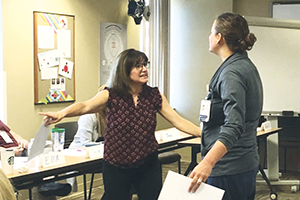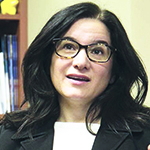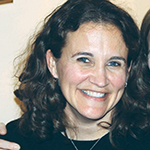By KATHLEEN NELSON
Awkward moments between caregiver and child are an everyday occurrence — at a grocery store, movie theater or in a park — when a caregiver's attempt to silence or discipline a child escalates in intensity. As the family becomes stressed, bystanders become uncomfortable. Some have the urge to scold or glance sideways in disapproval. Others want to walk away. Still others want to step up to calm the situation but are unsure how to intervene without angering the parent or making the situation even worse. So, most do nothing.

In a role play during a Support Over Silence for KIDS training session, program developer Nancy Weaver, center, plays a mom trying to get her child (the taller woman) to leave a cafeteria. Another member of the class will demonstrate how to engage with the mother and child to calm the situation.
A program called Support Over Silence for KIDS, however, provides positive options for defusing challenging situations between caregivers and children. Among its founding partners and sponsors are SSM Health Cardinal Glennon Children's Hospital in St. Louis, which is training some of its employees in the techniques.
"It's not designed to fix parenting but to address an immediate need in an acute situation," Nancy Weaver, the program's developer and director, said of the training. "It's about listening, offering empathy — and maybe a little distraction."
Research meets real life
The spark for the program was struck four years ago, when Weaver was out for pizza with her family. Seated at a nearby table was a grandmother, growing increasingly frustrated by the behavior of her two grandchildren. When the trio caught the attention of the patrons and staff, Weaver walked over to their table, "without a plan" and said to them, "It looks like you guys are struggling."

Weaver
The grandmother opened up about her frustration with work and outside responsibilities. After a few minutes of listening, Weaver helped fill up the kids' plates from the salad bar and went back to her table. The restaurant's staff thanked her for helping calm the situation. But despite her background as a professor of behavioral science and health education at the Saint Louis University's College for Public Health and Social Justice, Weaver wasn't sure she had done the right thing. She polled her colleagues at SLU and FamilyForward, where she was a member of the advocacy board. The latter organization assists at-risk children and families. No one could give her a definitive answer.
"I had found a void," she said. "You love those moments when your life and science collide. They speak to your personal curiosity and research."
She applied for and received a three-year grant from the Missouri Foundation for Health to research and develop a bystander intervention, assembling a team that included colleagues from SLU, FamilyForward, Safe Connections and Dr. Timothy Kutz, director of the Division of Child Protection at Cardinal Glennon. Safe Connections is a crisis intervention and counseling agency that aims to reduce the incidence and impact of relationship violence including sexual assault.
After researching the effectiveness of bystander training programs designed for intervention in sexual assaults, Weaver's group decided to tailor a similar training to defuse challenging situations between caregivers and their children. The training incorporates elements of trauma-informed care, which recognizes that people may have experienced trauma in the past. This approach can apply to both caregivers and children.
KIDS first
The two-hour, in-person program was designed for a broad-based audience. It teaches bystanders how to quickly notice an event, decide what to do and provide support. The training offers several options, depending on the bystander's own background and the nature of the incident. The hallmark of each option is that it is empathy-driven and judgment-free. No sideways glances. No reproach. No scolding.
"A lot of people say they could never tell a parent what to do or that what they see makes them angry," Weaver said. "We train them to realize that, manage it and offer alternatives."
To recall the options quickly, Weaver and her team developed the KIDS mnemonic:
K: Offer Kind words. Or, Keep to yourself if you notice an event and determine that the parent and child are handling it well/sufficiently.
I: Intervene directly. Weaver's action at the pizza parlor is a good example. Another example would be offering to call someone to help, such as another caregiver familiar with the child or children.
D: Distract. Drop an item from your purse or do something else to divert the attention of the caregiver or child or both. If in a grocery store, ask, "Which cereal (or soup) should I get?"
S: Seek help. If the situation has escalated, there are times when the store's management or other official can offer more effective assistance or can help one overcome personal barriers for intervening.
Just add empathy
"It's almost overly simple," Weaver said. "It doesn't require complicated decisions. Cardinal Glennon was very supportive of our approach because it was simple and based on empathy."
Using Cardinal Glennon as a pilot, Weaver's team employed the train-the-trainer model. They trained 30 employees, who were team leaders or directors in departments that included nursing, pastoral care, social work and other groups. This core group is now training members of their respective departments.

Chambers
Among the core group was Rebecca Chambers, manager of the transitional care unit at Cardinal Glennon. She has trained about 20 of her fellow nurses. Chambers noted that she and her nursing staff often use distraction techniques with young patients but that they initially questioned whether these techniques would be as accepted outside the hospital.
"It's been nice to learn that most parents are grateful for assistance," she said.
In addition to Cardinal Glennon, Support Over Silence for KIDS has trained SLU students and members of community groups. Following each training session, the trainers have interviewed the trainees. Among their findings:
- 86% of participants felt that the program changed their attitudes about their role in the community.
- 90% said they feel confident that they can do something to help caregivers and their children.
- 95% said they will pay more attention to caregivers and their children.
Chambers has used the training at work but found it more valuable away from work, "in public places where children are abundant but not happy." She recalled waiting in line at the grocery store, where a caregiver and child were at odds over the child's demand for candy. As the exchange grew louder, Chambers dropped her keys.
"I've done a fair amount of distraction," she said.
Scaling up
Support Over Silence for KIDS has printed key cards with the mnemonic, so trainees can keep a reminder close at hand. It also has developed a facilitators' guide, users' guide and evaluation tools and has beefed up its presence on social media.
"Now, we're looking at ways to scale up," Weaver said, adding that she has received inquiries from groups around the country who are interested in the training. Weaver said the training may be offered to other SSM Health facilities as well as employees of retail establishments, and members of church groups and nonprofit organizations that focus their services on families and children.
"The training helps you acknowledge that these are behaviors that shouldn't happen to children and that it's OK to feel uncomfortable when you see it happening," Chambers said. "But then they give you tools to help. Everybody seems to come out with a positive experience."